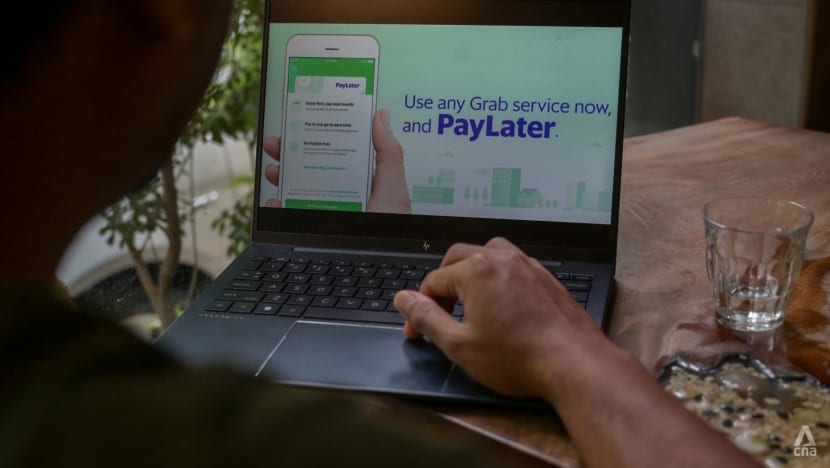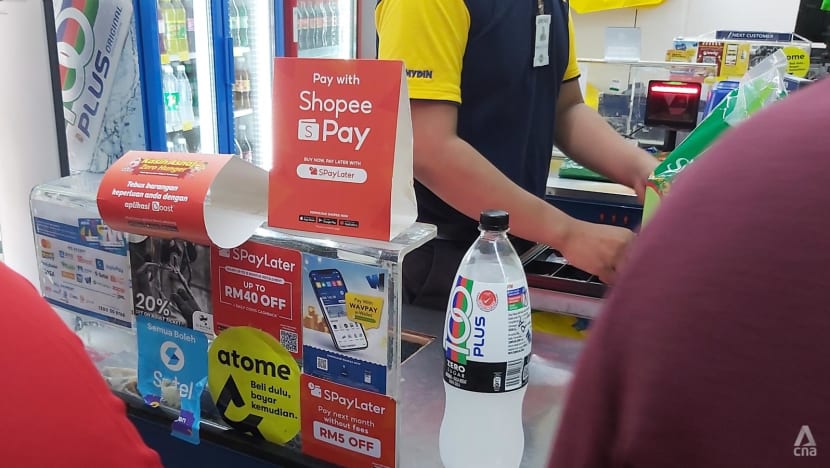'Made too easy': Buy now, pay later schemes ensnare consumers in Malaysia in web of purchases, debt
There are some 2.9 million active BNPL users in Malaysia, according to the latest publicly available information on the Consumer Credit Oversight Board (CCOB) website.

Grab's PayLater campaign poster on the internet. The Consumer Credit Act (CCA) is being drafted to impose tighter regulations on credit providers, particularly those offering “buy now, pay later” services, says Bank Negara Malaysia. (Photo: CNA/Fadza Ishak)

This audio is generated by an AI tool.
KUALA LUMPUR: Lift technician Arif has been under pressure “a few times” in order to make payments for items he had bought using the “buy now, pay later” (BNPL) mechanism.
The financing option lets one split the cost of a purchase into smaller instalments paid over time.
This led the father of two to be tempted to make many purchases he did not require ranging from shoes to clothes and even watches. Many of these items, Mr Arif admitted, are left unused.
“(The BNPL services) were just too simple and it really made me spend on things that I didn’t need. I’m not even sure if it was also a want. Thankfully, I have learned my lesson. The BNPL is good (only) if you have financial discipline,” said the 34-year-old.
He is among the 2.9 million active BNPL users in Malaysia, according to publicly available information on the Consumer Credit Oversight Board (CCOB) website.
As of end-September last year, the CCOB said that overdue payments for BNPL services was four per cent, with 1.3 per cent missing out on payments for more than three months.
The balance not paid for BNPL transactions was RM0.9 billion (US$665 million). In comparison, credit card debt in Malaysia stood at RM40.3 billion, data on CCOB’s website also showed.
And though BNPL debt pales in comparison to other forms of debt, it appears that the Malaysian government is hoping to nip this growing issue in the bud. With BNPL services in Malaysia expected to experience rapid growth in the coming years, the authorities are in the midst of drafting a law to deal with such services as they are currently unregulated.
The CCOB task force told CNA that it expects the legislation – the Consumer Credit Act - to be tabled in parliament in the second half of this year.
Financial literacy experts laud the move by the authorities as they say that the relative ease of the BNPL services give people a false sense of purchasing power and are designed to make them spend more in the long run.
One economist also hopes that the law being worked on by the authorities offers “sufficient consumer protection”.

BNPL SERVICES HAVE FINANCIAL LITERACY EXPERTS WORRIED
The CCOB is led by the finance ministry, BNM and the Securities Commission, with a mission of regulating non-bank credit providers and credit service providers.
According to its website, the usage of BNPL services in Malaysia gained traction with double-digit growth across quarters in 2023.
From January to September last year, there were altogether about 52 million transactions worth RM4.3 billion recorded.
The volume of these transactions grew at an average of 21 per cent every quarter, with a 16 per cent growth in value every quarter.
Most of the recorded transaction value for BNPL ranged from RM40 to RM500, or an average of RM84.
The allure of being able to make purchases on the fly without the financial capabilities to do so have led some consumers in Malaysia to fall into a debt trap, with one financial literacy expert telling CNA that he is seeing more consumers getting caught up in their BNPL payments.
Financial literacy expert Faiz Azmi told CNA that the use of BNPL services “was a pretty bad idea”, equating it to giving a subprime loan to people who do not deserve it.
“It enables people who cannot afford something to believe that they are able to do so,” he said, adding that many companies were using the BNPL platform to promote their goods.
Mr Faiz noted that credit cards, personal loans, and higher purchase loans are under the purview of the BNM, but that BNPL companies do not have to report to any regulatory authority and would not be part of the current debt-monitoring system.
“For all financial institutions, if you have a gross income of below RM3,000 monthly, you are limited to a 60 per cent debt service ratio (DSR). So out of your RM3,000, 60 per cent which is RM1,800 can be used for financing. Let’s say you have a car loan and a personal loan, and you want to buy a house.
“It turns out that the commitment to buy a house will push your DSR to above 60 per cent. The banks will have to reject you. But imagine someone who (purportedly) has a low DSR but has hidden DSR through these (BNPL) companies because they still must pay the instalments … (these payments) won’t be seen (in the system).
“Banks will say you have no financing and no commitments, at least not what we can see. So, they will approve this financing for you. This person might have a false sense of financial planning since the bank approved his loan,” he said.
Anecdotally, Mr Faiz said that he has seen a surge in the number of people who are telling him that they are caught up with their BNPL payments.
“Certain debts are beneficial but other debts are not. Let’s take the iPhone for example. For some people, the iPhone might be useful and if they can use it to elevate their business, why not?
“But if you buy (an iPhone) just to show off and to keep up with (appearances), and there is interest (payments), then that is a very bad debt,” he said.
NEW ACT SEEKS TO ENSURE PROPER CONDUCT OF CREDIT SERVICES
In its Financial Stability Review for the second half of 2022, BNM said that more than 80 per cent of BNPL users earn less than RM3,000 a month, and were therefore more susceptible to financial stress.
The central bank said that the relatively easier access to BNPL facilities may place users at a higher risk of spending beyond their means, without considering their ability to promptly repay the full loan amount.
BNM said that once the Credit Consumer Act was enacted, non-bank credit providers such as BNPL providers will be required to comply with relevant prudential and conduct standards.
“Apart from promoting a level playing field between banks and non-bank BNPL providers, these ongoing efforts aim to accord the same level of protection to financial consumers in relation to BNPL schemes regardless of which provider they deal with.
“These efforts will also help to mitigate risks from over-indebtedness building up among younger and lower-income borrowers,” BNM said in the report which was released last year.
The CCOB task force told CNA that the main objective of the Credit Consumer Act is to protect the interests of credit consumers by regulating credit business and credit service business, ensuring proper conduct and responsible lending practices in the credit industry; as well as promoting a fair, efficient and transparent credit industry.
“The transformation of the consumer credit regulatory landscape will be completed in phases. For the first phase of Credit Consumer Act implementation, CCOB will oversee the credit providers and credit service providers who are not regulated by any authority.
“These include the ‘buy now, pay later’ schemes, factoring and leasing companies, impaired loan buyers, debt collection agencies and debt management agencies,” it said in a statement to CNA.
WHAT BNPL PLAYERS HAVE TO SAY
The three major providers of BNPL services in Malaysia last year were Shopee, Grab, and Atome. According to the CCOB, these three providers made up 97 per cent of all BNPL transactions.
Mr Alain Yee, Head of SeaMoney and ShopeePay Malaysia, told CNA that in a similar method to using credit cards, consumers made use of deferred payment or instalment options in order to pace and spread out their payments in accordance with their own budgets or financial planning goals.
He, however, said that not everyone has equal access to credit cards or other financing services, as the firm found that around 10 per cent of SPayLater users lacked access to conventional credit options.
“The availability of BNPL services allows this demographic to purchase and afford necessities in times of need, including bill payments, purchasing insurance policies and other essentials,” he said in response to queries by CNA.
Mr Yee added that from their data, fast moving consumer goods - which are items sold quickly at relatively low costs - consistently sat at the top of the most purchased products using their facility.
“While consumers’ financial behaviour plays a big part in managing their budgets, it is also integral for BNPL providers to take proactive measures in protecting users from overspending.
“With SPayLater for example, users are provided with individualised credit limits suited to their repayment capabilities, and users are often encouraged to plan out their payments alongside early reminders of upcoming payments,” he said.
Mr Yee said that when new users activate SPayLater for the first time, they are provided with a lower credit limit that typically ranges from RM100 to RM300.
And as users continue to utilise the service, several factors will be considered, including their spending and repayment capabilities.
“Upon internal reviews, users will receive an adjustment to their credit limits, possibly seeing an increase or decrease in their credit limits,” he said, adding that the growth in its user base has been consistent and healthy.
As a result, Mr Yee said that they have seen a decline in the numbers of payment delinquencies as well as overdue payments.
He also welcomed the proposed Credit Consumer Act, saying that it would foster a fair and safe environment for both consumers and consumer credit service providers.
“Key initiatives that stand out in this regard include the Credit Consumer Act’s requirement for providers to perform affordability assessments on users. This serves a dual purpose for providers to better understand and suit their offerings to individual users, while protecting users from unintentional over budgeting,” he said.
Meanwhile, Ms Daphne Lourdes, the general manager of Atome Malaysia, told CNA that the firm has taken steps to ensure that its users do not spend beyond their means.
“We personalise the credit limit for every customer based on our proprietary AI-based credit underwriting model,” she said.
Among the measures taken by Atome when a user ends up paying late for their BNPL purchases include suspending their account immediately to prevent further use as well as charging a fixed fee to re-activate the account once the user has settled all outstanding payments.
“We want users to pay on time, every time and we are incentivised to ensure that users do not overspend and end up missing payments,” said Ms Lourdes, adding that the firm has a user base of over three million users.
On the upcoming Credit Consumer Act that is set to be tabled by the end of the year, Ms Lourdes said that Atome has been in a “very healthy dialogue with the regulators”.
“The upcoming Credit Consumer Act is a positive step towards enhancing consumer protection, protect against excessive debt and ensuring a stable and sustainable financial ecosystem. It will also provide BNPL operators with greater clarity, transparency and fairness and foster greater trust among consumers and merchant retailers too,” she said.
Grab did not respond to requests for comments.
EASY TO APPLY, EASY TO GET TRAPPED
The Credit Counseling and Debt Management Agency (AKPK) - an agency under the purview of BNM – told CNA that the BNPL providers make it easy for consumers to apply and subsequently be approved to use their services.
“It is so convenient. You can even pay for food in instalments via your apps. It’s made too easy I think,” said AKPK head for household financial education Nirmala Supramaniam.
According to Mdm Nirnala, she noticed that a lot of what the youngsters spent on with these BNPL services were for “experiences” such as short holidays, facials, or even for hair coloring.

“Lets just say I am getting an instalment to buy an oven or microwave to expand my home business to generate more income, that would be for a productive purpose … But if we are doing it to take a short holiday or even for a facial, those are lifestyle indulgences which will add on to our burden. If we don’t have the cash to pay for it, we should delay it until we save up for it,” she said.
Mdm Nirmala pointed out statistics from the CCOB which highlighted that 47 per cent of the 2.9 million BNPL users in Malaysia within the last one year were within the age bracket of 31 to 45.
This age group corresponded with the majority of AKPK’s clients, she said. AKPK - which deals with people with financial problems - does not have statistics on BNPL users because these services have yet to come under their purview.
“At this age, we can say that commitments are very high because after (the age of) 30, people are starting their families and commitments grow. There is a tendency for people to take up loans … It is important for consumers to understand and analyse their own capacity, and with regulations for it,” she said.
Consumers aged 21 to 30, meanwhile, made up 44 per cent of BNPL users in Malaysia, according to CCOB statistics.
“If they are going to start themselves getting into this habit of “experience now pay later”... when commitments grow after the age of 30, it might be a problem,” said Mdm Nirmala, adding that BNPL advertisements can be seen everywhere.
“What we are worried about is the habit they are cultivating, especially if it's from young. Those days, our parents hardly got themselves into debt because there were no such facilities,” she said.
A BNPL user who only wanted to be known as Harmit, 31, told CNA that he only uses BNPL to take advantage of exclusive offers for using such services as well as the zero per cent instalments offered to match his monthly cash flow.
“I believe it is only to be used if the instalments are zero per cent; and you already have the means to purchase the item. The last thing one needs is to fall into a debt trap,” he said.
Sunway University economics professor Yeah Kim Leng, however, said that while BNPL facilities are convenient for customers to have access to necessary goods and services, it could also lead to a situation of high indebtedness among them.
“It is a concern because it could encourage overspending beyond (their) means. This is unhealthy and the (anticipated) Act is supposed to ensure sufficient consumer protection,” he said.
Dr Yeah warned that easy payments schemes such as BNPL could become a trap for those who do not understand its conditions.
He hopes that the government would enhance financial literacy among consumers so that they were aware of any pitfalls of such facilities.
“It is timely to have such regulations enacted to enhance consumer protection and so that only bonafide facilities that do not exploit consumers are approved,” said Dr Yeah.


















